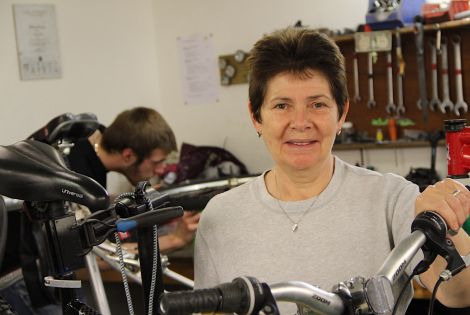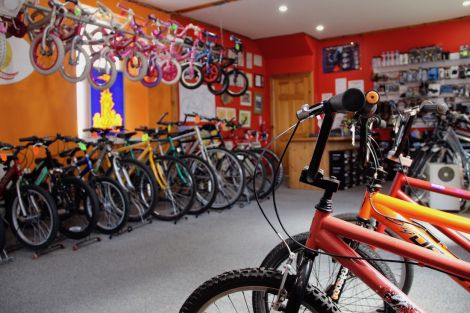Market House / A project that turns lives around
SHETLAND Community Bike Project provides paid and volunteer placements for people with barriers to employment, equipping them with transferrable skills, experience and confidence to help them get back into work. Louise Thomason went along to speak to the people who have been making the project the success that it is.
Established in 1999, the charity was formed after various agencies recognised a need for a project which could help people with drug and alcohol problems.
At its premises in Commercial Road it provides a repair service, bike hires and maintenance and repair classes to school groups. The project also promotes cycling and road safety, and an active lifestyle, while encouraging waste minimisation.
Manager Caroline Adamson said the project had grown and become busier since moving to the Commercial Road site in 2010.
“We’re just busier, there’s more folk coming through the doors and we have a waiting list, but the work that we do is still the same.
“The recycling is one part of it and the waste minimisation, but our main aim is to help folk with barriers to employment and help them back into work.
“We’ve had tremendous success since we started, but more so since we came here as we can help more folk.”
The project does indeed have a good track record: in the last year, 100 per cent of their clients (25 people) found employment following their placement, and on average this is around 90 per cent.
People can be referred to the project through many agencies including Job Centre Plus, the substance misuse service, the NHS mental health team, Life Skills and the Moving On Employment Project.
The bike project works closely with Shetland’s Employability Pathway, helping clients remove barriers before then moving on to either a job or perhaps to job brokerage where they can gain more experience before looking for a job. While the remit for referrals was originally drug and alcohol dependency, currently it is any barrier to employment.
Clients can receive paid placements for six, twelve and eighteen months. While there, they gain experience in fixing up bikes, however the placement provides much more than that.
Project worker Neil Leask said: “[Clients will] always mind the first bike they do. It might take them a while – it might take them weeks, or even months – that you could have had done in two or three days, but there’s no hurry. It’s not about the bike.
“That’s what a lot of folk don’t understand, especially folk coming in to the shop – the bike side of it is a sideline. The bike project is just something for us to do with the clients that we have here.”
Neil has worked at the project for nine years, initially on a placement, before being taken on as a full time employee.
“I started working in 2008. I was jobless, I’d had my own company but I lost everything, I was an alcoholic. I’d been on jobseekers allowance for that long but there was nothing to do sitting around the house but think about having a drink,” he said.
What started out as a placement turned Neil’s life around.
“My life changed for the better once I started at the bike project, giving me reason, purpose and something to look forward to every day. After my six month placement, I was offered a full time job as a project worker, which I took as I felt I could help other clients going through similar problems.
“When you’re down there at the bottom it feels like a bottomless pit that you can’t get out of. You get so far up, then you fall back down again. It was combination of my parents and Caroline [at the project] that got me out of it.
“Once I got to the stage when I was working here I could have gone and gotten a job somewhere else, but half the problem is, you didn’t have a driving licence so you couldn’t get to work, or you need a licence for your work… but not just that, I realised I could help folk with addictions as well.”
The project has received recognition for its work, being named Skills Development Scotland’s Youth Employer of the Month in 2014, while it was recently recognised nationally when the Care Inspectorate used the bike project project as an example of best practice.
The project receives core funding from Shetland Drug and Alcohol Partnership, the Fairer Shetland Fund and Community Jobs Scotland. While the sale of bikes and hires generates some income, with a fluctuating staff its funding is very important.
The donation of bikes for the public is, of course, crucial, and on average the project receives six per day, which equates to 142.5 tonnes of recycling the project has processed since 2010.
The project currently employs eight clients. Over the year, that equates to about 25 people.
Caroline said: “One of the things that really works here with the folk that do have problems is when they can open up. They can see that they’re not being judged.
“When Neil can speak to them about what he’s gone through, it helps a lot of them. Then they open up and it helps them see where they’re at and how things can get better.”
This supportive environment is key to the project’s success.
Neil said: “When you saw the state I was in – I’d lost my bairns, my girlfriend, my business… and I still didn’t care, I was still drinking. The first thing I thought about when I woke up was drink. And it’s a vicious circle, but luckily that’s all in the past. The bike shop is a brilliant place. Brilliant place.”
For more information about the Shetland Community Bike Project, please call 01595 690077 or drop along to 16-18 Commercial Road, Lerwick.
Become a member of Shetland News
Shetland News is asking its readers to consider paying for membership to get additional perks:
- Removal of third-party ads;
- Bookmark posts to read later;
- Exclusive curated weekly newsletter;
- Hide membership messages;
- Comments open for discussion.
If you appreciate what we do and feel strongly about impartial local journalism, then please become a member of Shetland News by either making a single payment, or setting up a monthly, quarterly or yearly subscription.



